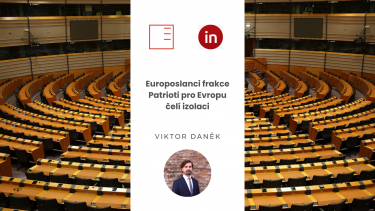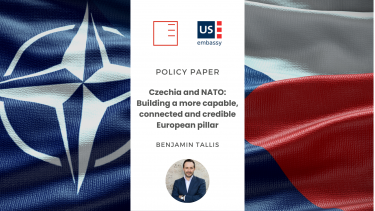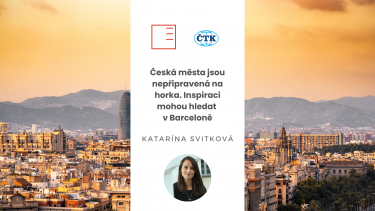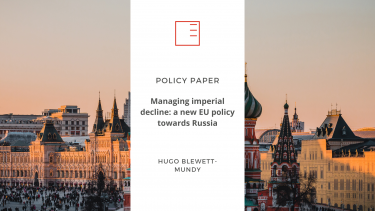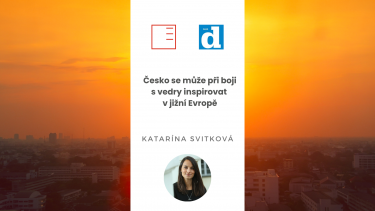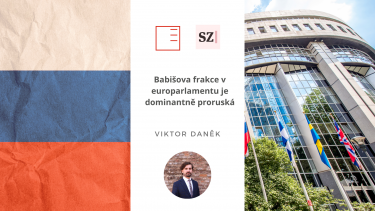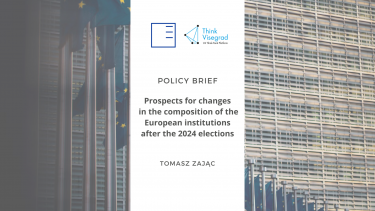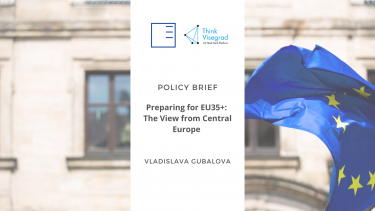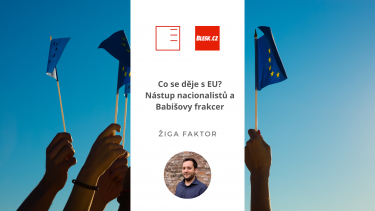Novinky.cz | MEPs of the Patriots for Europe group face isolation
MEPs from the Patriots for Europe, including representatives of the ANO movement, face isolation in the European Parliament. They are unlikely to secure key positions, significantly limiting their influence on the legislative process. Other political groups are attempting to isolate far-right parties through a so-called cordon sanitaire, a measure already felt by Klára Dostálová, who was not elected Vice-President of the EP. Viktor Daněk, Deputy Director of EUROPEUM Institute, commented on the situation for Novinky.cz.
Show morePolicy paper | Czechia and NATO: Building a more capable, connected and credible European pillar
CEE allies are key to building the capabilities-based, European Pillar NATO needs to enact genuine burden shifting and secure the alliance’s future. Dr Benjamin Tallis shows how Czechia can build on recent progress in defense procurement and increase its influence by prioritising the six elements Euro-NATO needs: core national war-fighting capabilities, logistics, military mobility, strategic enablers, air defence and long-range strategic strike.
Show moreČTK | Czech cities are unprepared for heatwaves. They can find inspiration in Barcelona
Czech cities can draw inspiration from southern Europe in combating heat, such as Barcelona, which has effective plans and is better adapted to high temperatures. For instance, the city boasts over two hundred "climate shelters" in publicly accessible spaces like museums, galleries, offices, and libraries, providing drinking water, air conditioning, and informational services. However, the Czech Republic is unprepared for heatwaves. Associate Researcher Fellow at EUROPEUM Institute Katarína Svitková commented for the Czech News Agency.
Show more
Policy paper | Managing imperial decline: a new EU policy towards Russia
Russia's full-scale invasion of Ukraine in February 2022 has shattered the post-Cold War international order built upon East-West interdependence and cooperation. The European Union (EU) - which had tried to pursue a strategic relationship with Russia after the collapse of the Soviet Union in 1991 - must now adapt to the geopolitical reality of Russian neo-revisionism. Hugo Blewett-Mundy, an Associate Research Fellow at EUROPEUM Institute, identifies four areas where the EU's policy towards Russia could evolve to confront this emerging security situation in Europe.
Show moreDeník.cz | Czech Republic can find inspiration in southern Europe in the fight heatwaves
Czech cities could take inspiration in combating high temperatures from cities in southern Europe, such as Barcelona, which has effective plans and is well-adapted to extreme heat. Barcelona boasts over two hundred climate shelters in publicly accessible institutions like museums, galleries, offices, and libraries, providing drinking water, air conditioning, and informational services. According to Katarína Svitková, an Associate Research Fellow at EUROPEUM Institute, Czechia lacks action plans and responds to heat only at the last minute. Preparedness for tropical days is crucial for protecting the population, especially seniors and young children, for whom summer days are the most demanding.
Show more
Seznam Zprávy | Babiš' political group in the European Parliament is dominantly pro-Russian
The ANO movement has joined the new group Patriots for Europe, which it co-founded to promote national interests in Europe more effectively. Now it is third-largest in the European Parliament and includes, among others, the French National Rally of Marine Le Pen, and the Hungarian Fidesz of Viktor Orbán. Viktor Daněk, Deputy Director of EUROPEUM Institute talked in the podcast 5:59 of Seznam Zprávy how this affiliation could affect the perception of the Czech Republic abroad.
Show morePolicy Brief | Prospects for changes in the composition of the European institutions after the 2024 elections
This policy brief analyses the prospective changes in the European Parliament (EP) composition following the 2024 elections. It reflects on the evolving political environment since 2019, highlighting shifts in party dynamics within the EP, such as the fragmentation of traditional party dominance and the emergence of new political alignments. Additionally, it explores potential reconfigurations in top EU positions post-elections and examines ongoing concerns regarding geographical representation within EU institutions, particularly the European Commission. Writes Tomasz Zając from the Polish Institute of International Affairs (PISM).
Show morePolicy Brief | Preparing for EU35+: The View from Central Europe
Despite the historical support of EU enlargement policy by the Visegrad Four (V4), these Central European states are now faced with the challenge of reconciling their stances with the new realities of the process. As Ukraine and Moldova opened their accession negotiations, the EU seems to be torn on the questions associated with the future enlargement(s) - institutional reforms and changes within the EU budget. Transitioning from economic beneficiaries to potential contributors, the V4 states must evaluate the potential political and economic impacts of new members on both the EU and their domestic levels. Writes and proposes recommendations Vladislava Gubalova from GLOBSEC.
Show moreBlesk.cz | What is happening to the EU?
The political helm of Europe is taking a new direction. And according to political analysts, not a favourable one. The results of the elections in France showed this, with the far right winning 37 seats and the left-wing coalition 32. What is more, since the weekend it has been known that a new faction is to be created in the European Parliament - one that is more focused on national interests. One of the three founders is the head of Czech ANO movement, Andrej Babiš. Žiga Faktor, deputy director and head of the Brussels office of EUROPEUM Institute, comments for Blesk.cz.
Show more
WhatNews | Cities are expecting another heat wave this year. What is Prague doing to keep us from getting baked?
The average temperature in the Czech Republic has increased by 2.2 degrees Celsius since the 1960s. As a result of climate change, the country is suffering more frequent weather extremes: torrential rain, drought and heat. Heat waves are particularly severe in heat islands that form in cities. Prague wants to rapidly reduce greenhouse gas emissions, add greenery and water features. Will it be enough? Katarina Svitková, an Associate Research Fellow at EUROPEUM Institute gives examples to WHAT news on how Barcelona is adapting to the heat.
Show more
Staroměstské náměstí 4/1
Prague 1 - Staré Město
110 00
tel.: +420 212 246 552
email: europeum@europeum.org
https://www.europeum.org
